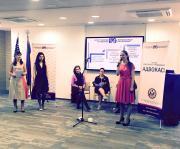IPG President at the 4th International NATO&EU Roundtable
On March 31, took place the 4th international NATO&EU Roundtable in Ministry of Foreign Affairs, in Tallinn.
Roundtable is organized in collaboration with the NATO Headquarters, Ministry of Foreign Affairs of Estonia, Estonian Foreign Policy Institute, the Friedrich Ebert Stiftung, British Embassy, NATO Cooperative Cyber Defence Centre of Excellence and with International Centre for Defence and Security.
The main topics of the conference in the first day were „NATO and the EU: Tackling the Challenges of Hybrid Warfare Together”, “A New Global Strategy for the EU`s Foreign and Security Policy” and “The Warsaw Summit: Managing Threats from East and South”. Panel discussions were held by internationally renowned experts like Prof. Julian Lindley-French, Vice-President, Atlantic Treaty Association; Commander Kurt Engelen, Staff Officer Cooperative Security, Permanent Representation of Belgium to the NATO Military Committee; James Sherr, Associate Fellow, Russia and Eurasia Programme, Chatham House; Dr. András Rácz, Senior Research Fellow, Finnish Institute of International Affairs; Commander Hans Huygens, ACOS Strategy Defence Policy Division Chief, EU Section; Colonel AivarJaeski, Deputy Director, NATO Strategic Communication Centre of Excellence and many others. The conference was opened by Marina Kaljurand, Minister of Foreign Affairs and Dr. Gerlinde Niehus, Head of Engagements Section, Public Diplomacy Division, NATO Headquarters.
The conference brings together young professionals and diplomacy students from 31 countries, who are from both NATO and the European Union member states, as well as the Eastern Partnership countries but also Russia, Israel, Argentina and Indonesia.
At the moment there is on-going two-day NATO work simulation at Saka manor in Ida-Virumaa, where there is played through the work of the NATO committees and as well as a fictitious crisis situation that is guided by Commander Kurt Engelen (Staff Officer Cooperative Security, Permanent Representation of Belgium to the NATO Military Committee) to get a better understanding of how NATO could behave in similar situations.


